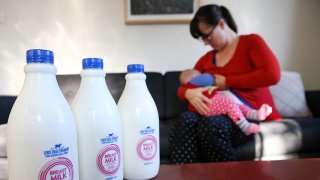
Closeness and skin-to-skin contact are a major part of breastfeeding a newborn. But, during the coronavirus pandemic, is it still safe to nurse a baby?
Yes.
According to the World Health Organization (WHO), breastfeeding is perfectly safe during the coronavirus pandemic – even if a mom has tested positive for COVID-19. To date, the WHO says there has been no transmission detected of active COVID-19 through breast milk or breastfeeding.
“There is no reason to avoid or stop breastfeeding,” the WHO’s website states in a list of COVID-related breastfeeding questions and answers.
San Diego resident Leilani Songer couldn’t agree more. She owns and operates Leilani’s Lactation & Wellness Center in Mission Valley, where she helps moms struggling with breastfeeding.
She’s been an expert in the field for 15 years and strongly believes it’s always healthiest for moms to breastfeed their babies.
Now, in the middle of a pandemic, Songer said many moms might be concerned with exposing their babies to COVID-19. After all, when a mother nurses her newborn, there is no social distance.
Local
Relying on the WHO’s guidelines on the matter, Songer said the practice of breastfeeding remains safe – pandemic and all. She said moms should wash or sanitize their hands prior to handling their baby or breasts, but cuddling close to one's newborn is still OK.
Songer said those first few feedings – right in the hospital – hold the highest antibodies for a newborn.
“Women’s bodies are perfectly designed to provide the perfect milk for the baby,” Songer explained. “Breastfeeding, by far, is the best. It’s the perfect medicine.”
According to the WHO, immediate skin-to-skin contact between a mother and her newborn continues to be the best practice and will help facilitate breastfeeding.
“The numerous benefits of skin-to-skin contact and breastfeeding substantially outweigh the potential risks of transmission and illness associated with COVID-19,” the WHO says.
But what if you suspect you have COVID-19 or have tested positive for the virus? Is breastfeeding still safe then?
The WHO, again, says yes.
In addition to washing their hands before a breastfeeding session, the WHO says moms who have COVID-19 should wear a medical face mask during any contact with their baby, including while feeding. Those masks should not be reused.
And, even if a mom has COVID-19 but does not have a medical face mask, the WHO says breastfeeding is still encouraged.
“Mothers (who don’t have a mask) should follow other infection prevention measures, such as washing hands, cleaning surfaces, sneezing or coughing into a tissue,” the WHO website says.
The organization notes that non-medical masks – as in homemade or reusable cloth masks – have not been evaluated in terms of their use during breastfeeding, so there’s no recommendation available on those, for now.
If a mom is too sick to breastfeed her baby due to COVID-19, the WHO said moms should either pump breastmilk and feed their baby that way or use donor human breast milk. Infant formula milk can also be used “with measures to ensure that it is feasible, correctly prepared, safe and sustainable.”
If a mom has COVID-19 and is not able to breastfeed, the WHO says there’s no fixed time interval to wait to start nursing again after confirmed or suspected COVID-19.
“There is no evidence that breastfeeding changes the clinical course of COVID-19 in a mother,” the WHO adds.
Songer said babies “are made and designed to breastfeed,” but it may not always be that easy. She said common breastfeeding challenges include awkward positioning for both mom and baby, and trouble properly latching. Babies may have a tongue-tie that prevents the proper latch.
But, as with many things in parenting, repetition is key.
“Really, it’s about practice,” Songer told Telemundo 20 and NBC 7. “Thankfully, moms get to practice eight times a day or more.”
In stressful times like these, Songer said breastfeeding should be a calm, gentle activity and an opportunity for a mom to sit and hold her baby in a quiet, stress-free place.
“The best thing you can do for your baby is stay close, bond, enjoy one another and try to relax the best that you can,” explained.
And, for moms who are struggling with breastfeeding, Songer said it’s all about believing in yourself and getting to know what your baby needs and wants.
“Trust your instincts,” Songer said. “Moms have an innate understanding of what your baby is talking about. So, trusting what your baby is saying, learning what your baby’s cues are is super vital to – not only your success in the beginning – but as you move from each stage. Every age has a stage. And so, trusting your baby; trusting your body.”
To read the WHO’s guidelines on COVID-19 and breastfeeding, click here.
UNICEF has also compiled guidelines for safe breastfeeding during the pandemic.
And, you can read/watch Telemundo 20’s report on this topic here.



